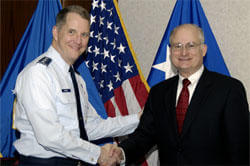The CEO: It's a position that carries a multitude of responsibilities, and serves as the face of a company, particularly when it comes to top-end companies like those in the S&P 500. In these tough economic times, leadership from the CEO position is more crucial than ever, and research evidence points up an interesting fact: military veterans are excelling as CEOs.
A report titled "Military Experience and CEOs: Is There a Link?" by Korn/Ferry International, an employment recruitment and talent management company, looks into this phenomenon, and has come up with some compelling numbers on how well veterans are performing as CEOs. Says Joe Griesedieck, Vice Chairman of Korn/Ferry International and co-author of the report, "We saw that a number of Fortune 500 companies had CEOs with military experience, specifically former officers, so we looked to see if there was a common link in how the companies were performing, how these veterans' tenures as CEOs compared to others, and what made them successful, versus what might make someone else successful."The report's major findings include the following:
1. Military officers are well-represented among the ranks of CEOs. Chief executives who served as officers constitute over 8 percent of all CEOs in the S&P 500, which is far above the average percentage of the entire U.S. male population who served in the military (3 percent).
2. CEOs with military experience have longer tenures as CEO than those without. The average tenure of a CEO with military experience is over seven years, while a CEO without military experience averaged under five.
3. CEOs with a military background are more likely to deliver strong performance. The Korn/Ferry study found that companies led by military veterans as CEOs delivered higher average returns than the S&P 500 index over one, three, five, and ten-year horizons.
Leadership Success
The Korn/Ferry report also includes interviews with CEOs with military experience, who cited a few reasons that could explain why veterans can be more successful than others at leadership positions. Clayton Jones, CEO of Rockwell Collins, notes that the leadership and management skills one picks up in the military can't be underestimated, "At a very younge age, you get a chance to be in leadership positions of significant magnitude," he says. "You become comfortable in a leadership role."
The late Michael H. Jordan, who served as Navy lieutenant and was a former CEO of Electronic Data Systems, commented in the report: "What the military is really good at doing is teaching you to plan and program. The essence of being an officer is to figure out how to deploy forces and resources to get something done. From a management standpoint, that is one of the really great lessons."
Adds Griesedieck, "None of the CEOs we interviewed were necessarily 'command and control' types -- there were no General Pattons in the group -- but they were people who understood the value of teams, and how to deploy teams effectively and delegate responsibility. They can make decisions without over-procrastinating. You can use the term 'battlefield decision' but they can take the facts on board, see what's there, and make good, sound decisions."
Jones also points out that military leaders must make tough decisions on a daily basis, which helps prepare them for the rigors of the corporate world. "Some people want to know more and more information before making a decision. In the military, you don't have that luxury. I have found that in business it is incredibly important to be quick to market, or deal with a crisis."
Military Experience vs. an MBA
The biggest hurdle veterans have to overcome to gain high management decisions is lack of industry experience compared to non-veterans, according to Griesedieck. "The hardest thing is for someone who’s been a career military person is how do you translate that experience into something that a company may need?" he says. "If you’re a technology business and making a very specialized product, you may have to come in at level dealing with product and customers, and the experience gap potentially works against people with a military profile."
Nevertheless, there is no substitute for experience, and veterans with leadership experience working in real-world environments could hold an advantage over an MBA graduate who is just starting out in the corporate world. "The MBA gives you tool and familiarity, but it doesn't put you in a real-world situation," he states in the report. "An MBA teaches you the analytical side, but not the people management side. That comes with experience."
Griesedieck offers the following advice for veteran officer job-seekers: "Take stock of what your strengths really are, and understand what those strengths have been within the parameters where you’ve operated. If you’ve been involved in an operation where hundreds or thousands of people have reported to you, ask yourself the same thing employers would ask of any candidate: What did you do opposed to what the company did? Are your strengths more to do with building teams? Being able to articulate what made you successful in your military career translates into opportunities for you.
"On the other side, I’d say to any corporate employer, you may need to take a leap of faith and allow these veterans entry into the company so they can apply their skills. Maybe they don't have industry experience but you have to ask yourself, In the long term, will their presence make you a stronger executive team?"




